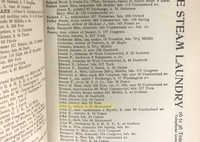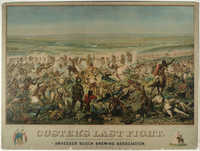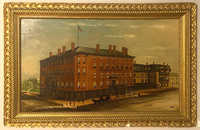Hayner Whiskey Advertisement
The New England Magazine, June 1903
Courtesy of William and Debra Barry
Booze may have been illegal, but it was always obtainable. Advertisements like this promised a "plain sealed case" would arrive in the mail.

McGlinchey's Brewery, Portland, ca. 1850
Maine Historical Society
Maine's Last Brewery
The New England Magazine, Neal Dow: His Life and Work
June 1894
Collections of Maine Historical Society
This image shows James and Patrick McGlinchy's Casco Brewery on the slopes of Munjoy Hill, the last active, legal brewery in 19th-century Maine. After Maine went dry in 1851, it was illegal to drink, possess, or sell alcohol but manufacturing remained legal until a stricter law was added to the Maine Constitution in 1885.
Advertisement for McGlinchy's Brewery
Courtesy of Will Anderson and The Great State of Maine Beer Book
Portland City Directory
1903
Collections of Maine Historical Society
While it was illegal to sell alcohol and saloons did not advertise, saloonkeepers continued to list themselves as such long after Maine became a dry state. John A. Feeney was the father of the Portland High School football star who went on to become award-winning movie director John Ford. Many Irish-American families such as the Feeney clan were proud of their connection with the saloon.
Custer's Last Fight
Casilly Adams
Chromolithograph published by Anheuser-Busch Company, 1896
Collections of Maine Historical Society; gift of William B. Jordan, Jr., 1998
This ubiquitous barroom image of the late 19th century was a colorful, inaccurate nod to macho patrons, believed to have come from Donahue's bar in Portland. About this picture, one critic commented: "Copies can be viewed in barrooms, taverns, hotels, restaurants, and museums throughout the country. It is probably safe to say that in the fifty years elapsing since 1896 it has been viewed by a greater number of lower-browed members of society and by fewer art critics than other picture in American history."
Frank Jones Brewing Company Poster
Lithograph, ca. 1900
Portsmouth, New Hampshire
Courtesy of The Great State of Maine Beer Book, Will Anderson
MHS QJ M 338.476633 An24
Frank Jones ran the largest brewing company in the world. From the late 1880s, long after the Maine Law prohibited alcohol in Maine, the state was a key market.
Rum Cart in Gorham's Corner
Portland, ca. 1900
Collections of the Maine Historic Preservation Commission
Portland's Gorham's Corner (the intersection of Fore, York, Danforth, and Pleasant streets) was a largely Irish-American neighborhood with more than its share of kitchen bars. This photograph shows a rum cart making an illegal, though hardly clandestine delivery.

John Ford, movie director, ca. 1920
Maine Historical Society
John Ford
ca. 1920
Collections of Maine Historical Society, Gannett Glass Plate Negative Collection
One of the major figures of American industrialization, Henry Ford (born John Feeney in Portland), was an advocate for Prohibition in the States. Ford aimed to hire only family men, who led a life free of gambling and drinking.
Bangor House
Joseph F. Hatch,1883
Oil on canvas
Collections of Bangor Historical Society
Maine's grand city hotel is said to have always served liquor by simply paying fines as the cost of doing business. In Portland, J.B. Brown's Falmouth Hotel reportedly practiced the same method.







